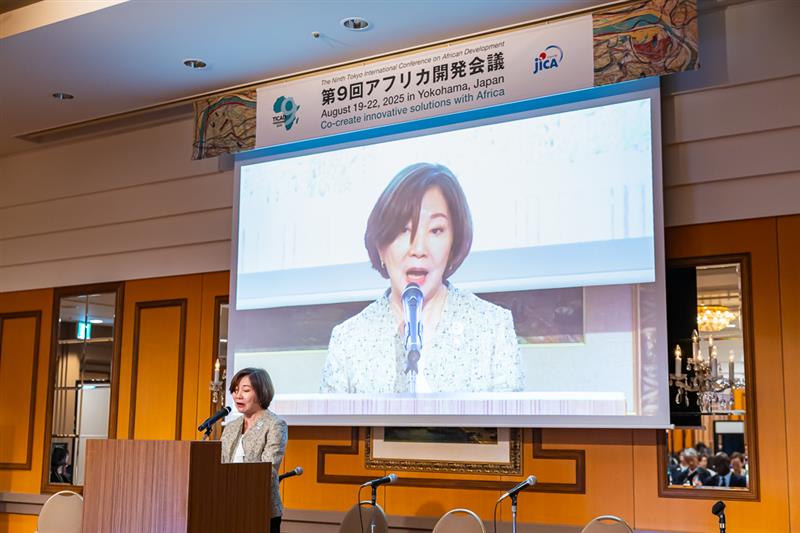TICAD9 Thematic Event - “Promoting Economic Inclusion and Self-Reliance of Forcibly Displaced Persons in Africa through Humanitarian, Development and Peace Nexus Approaches”
2025.09.08
1. On 20 August 2025, we, the Japan International Cooperation Agency (JICA), the United Nations Development Programme (UNDP) and the United Nations High Commissioner for Refugees (UNHCR), organized a thematic event on the margins of TICAD 9, which included participation of representatives from African states, regional organizations, and private sector.
2. We discussed efforts to promote the economic inclusion of forcibly displaced people in Africa through Humanitarian-Development-Peace (HDP) Nexus approaches, particularly in light of increasingly protracted displacement situations and declining humanitarian funding.
3. We recognized that displacement is increasingly protracted, with millions remaining in exile for years or decades, becoming a significant challenge on human security. The global total of forcibly displaced people surpassed 120 million by the end of 2024, driven by various reasons including armed conflict, climate change, and economic instability. This figure is nearly equivalent to the population of Japan, underlining the scale of the challenge.
4. We noted that, at the end of 2024, Africa hosts over 9 million refugees and 34 million internally displaced people (IDPs), representing about 30 percent of the world’s refugees and over half of its IDPs. The continent’s solidarity in hosting displaced people remains exemplary, despite mounting pressures on national systems and resources. We also noted that host countries, often low- and middle-income themselves, bear a disproportionate responsibility, with two-thirds of refugees residing in ‘first asylum’ countries.
5. We emphasized that humanitarian aid alone is insufficient to address the issue of forced displacement. Long-term, sustainable support is needed to assist both displaced people and host communities, and to foster peaceful coexistence between the two. Inclusion into national systems and services—such as education, health, and social protection—is essential to enhance self-reliance and strengthen local development. Displaced persons are not merely recipients of aid: when empowered, they contribute to local economies, strengthen social cohesion, and rebuild resilience.
6. We appreciated the Multi-stakeholder Pledge: Accelerate and Better Leverage Humanitarian-Development-Peace Nexus Approaches in Forced Displacement Settings, launched by the Government of Japan and UNDP at the 2nd Global Refugee Forum in December 2023, as a strategic framework to promote coordination and coherence across humanitarian, development, and peacebuilding efforts.
7. We reiterated that evidence shows that inclusive policies that enable displaced people to contribute to local economies and communities help reduce aid dependency, foster social cohesion, and improve economic outcomes for both displaced and host populations. In this light, we commended Kenya’s Shirika Plan as well as Mauritania’s inclusion policies in multiple sectors for refugees, as one of the many exemplary models to follow in terms of government-led responses to forced displacement.
8. We acknowledged examples of UNDP’s work where it contributed to resilience-building such as sustaining livelihoods and peacebuilding efforts in Sudan, with support from partners like Japan. We also underlined the urgent need to bridge the financing gap through innovative tools such as blended finance, social impact bonds, and debt-for-displacement swaps, as well as better coordination between humanitarian and development funding streams.
9. We recognized the role of regional organizations, such as the Intergovernmental Authority on Development (IGAD), in supporting member states to develop and implement frameworks for inclusion and durable solutions.
10. We reiterated that, with the right policies and conditions, refugees can bring significant benefits to host communities. We also emphasized that emerging evidence suggests that restrictive hosting policies are often costly—not only for donors, but also for host countries and communities. We welcomed the World Bank’s pivotal role, particularly through the Window for Host Communities and Refugees under International Development Association (IDA), in supporting host countries to implement policies that benefit both refugees and host communities.
11. We reaffirmed the importance of the ‘whole-of-society’ approach, and especially the role of private sector, in displacement responses through their innovative technologies and approaches. Investment in refugee-hosting areas, supported by enabling policies and flexible regulations, can unlock new opportunities for displaced people and local economies, including in the area of financial inclusion. International organizations are urged to support private sector’s activities through technical and financial means, together with the host countries. We underscored that inclusion is not charity but smart policy—reducing aid dependency, improving service delivery, and boosting economies.
12. We acknowledged JICA’s “KAERU” model for addressing forced displacement, which promotes the transformation of refugees from aid recipients to contributors and potential returnees. This model can be adapted and scaled to other countries, taking into account local contexts, to support the inclusion and self-reliance of forcibly displaced populations.
13. We welcomed UNHCR’s role in convening humanitarian, development, and peace actors to advance the inclusion and self-reliance of forcibly displaced populations. We also recognized UNHCR’s expanded engagement with the private sector to reduce barriers and mitigate risks for businesses, enabling investments that generate meaningful impact for both refugees and host communities.
14. We agreed that the Global Compact on Refugees (GCR) remains a vital framework for equitable burden-sharing and international cooperation.
15. Finally, we called for renewed awareness and engagement from all stakeholders—including governments, international organizations, civil society, and the private sector—to realize human security and the goals of the 2030 Agenda for Sustainable Development and the African Union Agenda 2063, ensuring that no one is left behind.

scroll